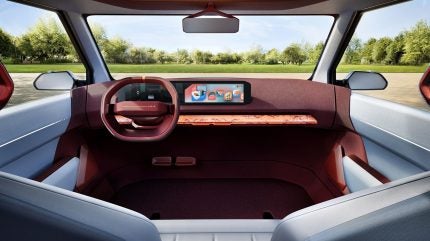
Kia Corporation has collaborated with materials companies Bcomp, Simplifyber, and Biomyc to integrate bio-produced materials into its Concept EV2, a B-segment electric SUV.
The model was unveiled during Kia’s 2025 EV Day event in Barcelona, Spain.

Discover B2B Marketing That Performs
Combine business intelligence and editorial excellence to reach engaged professionals across 36 leading media platforms.
The partnerships aim to replace traditional synthetics with bio-produced alternatives in Kia’s future vehicles, aligning with the company’s environmental goals.
Kia Europe Design Center senior designer CMF Nathalie Bucher said: “As we aim to bring innovative material solutions to the mass market, ongoing collaborations with companies like Biomyc, Simplifyber and Bcomp ensure that every material aligns perfectly with our vision, reinforcing our commitment to creating stylish, environmentally aware, and high-quality vehicles for the future.”
In partnership with Swiss cleantech company Bcomp, Kia has integrated ampliTex – a flax fibre-based composite – into the Concept EV2’s back seat shell and front seat substructures.
The ampliTex material offers lightweight properties, durability, and a refined appearance, while also supporting recyclability and end-of-life reuse.
This collaboration builds on Bcomp’s earlier partnership with Kia for the Concept EV3 and EV4 vehicles.
A custom dark-blue finish was developed in cooperation with Kia’s Europe Design Center to match the vehicle’s aesthetic.
Kia’s alliance with Simplifyber introduced dashboard and door panel components made from the company’s cellulose-based material, Fybron.
Simplifyber’s Fybron is derived from a mixture of wood pulp, lyocell, natural rubber latex, bio-based binders, and synthetic fibres.
The liquid-based production process, carried out at Simplifyber’s Raleigh facility in North Carolina, US, reduces material waste and simplifies assembly by delivering pre-shaped, textured parts.
Materials design firm Biomyc contributed mycelium-based components to the vehicle’s interior.
The mushroom-derived material serves both as insulation and a visual design element.
Biomyc developed a precise mould and growing technique to produce a seamless mycelium surface, alongside a colouring process that meets Kia’s Pantone specifications.
The firm also conducted research into sustainable coatings and additives, creating over 180 samples and compiling findings for future reference within Kia’s design operations.
Recently, Kia introduced AI voice assistant for the EV3 drivers as part of a range of features included in the company’s latest over-the-air (OTA) update.
These features cover improvements to voice control, connectivity, entertainment, and navigation.






